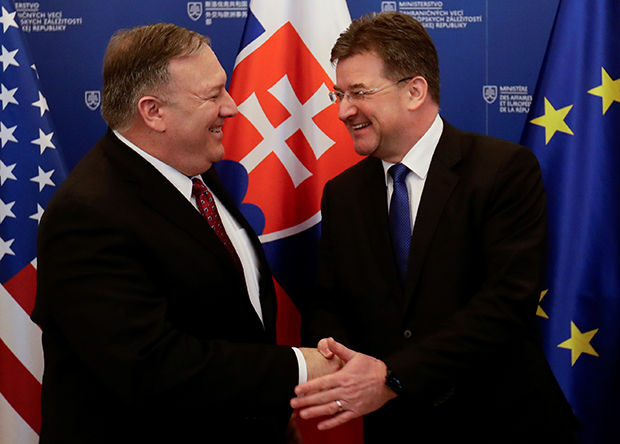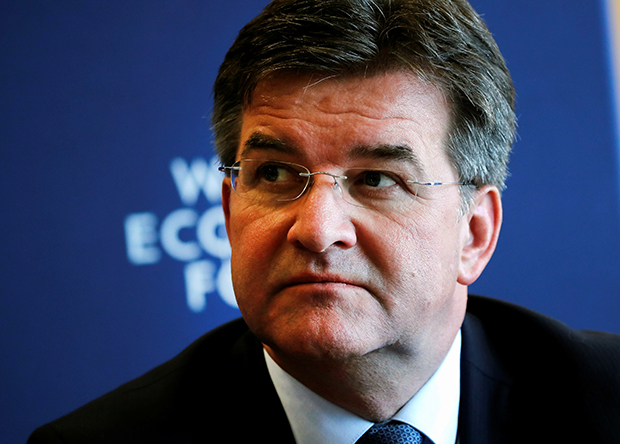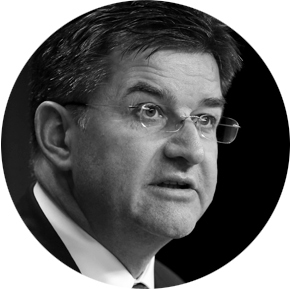Mediamax’s exclusive interview with OSCE Chairman-in-office, Foreign Minister of Slovakia Miroslav Lajčák
OSCE Chairman-in-office, Foreign Minister of Slovakia Miroslav Lajčák will be visiting Armenia on March 12 and 13. He spoke to Mediamax on the eve of the visit.
Since you became OSCE Chairperson-in-Office what developments have you seen in this region?
The South Caucasus remains an international focus and we have seen a number of noteworthy developments here recently. I took particular note of the post-election developments in Armenia and congratulate the Armenian people for the peaceful and democratic change. My visit to the three countries of the region, including Armenia, shows that the region is high on our agenda.
The OSCE plays a unique and perhaps irreplaceable role in the South Caucasus, in particular when it comes to conflicts. Concerning Georgia, the OSCE co-chairs the Geneva International Discussions and facilitates the Incident Prevention and Response Mechanism. Furthermore, our organization continues to be engaged through the Minsk Group Co-Chairs in their efforts to support a peaceful settlement of the Nagorno-Karabakh conflict. A number of other important activities are being implemented that contribute to stability and security in the region.
No other organization takes such a comprehensive approach to security. And when we say “comprehensive,” we mean on all levels, from geopolitical to individual. This focus on people, dialogue and stability is something that is at the very core of Slovakia’s 2019 OSCE Chairmanship.
And this is important, because ultimately, the OSCE is about the people living in the region. People who deserve the opportunity to live peacefully in the present while building a common future.
What are the primary issues to be discussed during your visit?
My programme is not final yet, but I plan to meet with the political leadership to see how we can best support Armenia in implementing its OSCE commitments, the peace process and the activities of the Minsk Group Co-Chairs.
And of course, beyond the conflict dealt with by the OSCE Minsk Conference, it is in the interest of us as the OSCE Chairmanship to maintain open and frank dialogue and good relations with all participating States, and to support progress on the ground. On all of my trips, I am eager to meet with and listen to our partners in the field, who work with an for people who are most affected by the situation on the ground. We should not forget, ultimately, that everything we do at the OSCE is to make the lives of our people a little easier.
I am using my visits to the South Caucasus to try to identify areas to mitigate the humanitarian consequences of conflict, and to make effective use of multilateralism to build a safer future for all people.
Presenting the priorities of the Slovak Chairmanship to the Permanent Council in Vienna on January 10, you talked about the recent intensification of dialogue and the decrease in ceasefire violations and casualties in the Nagorno-Karabakh conflict. A week after that Armenian and Azerbaijani FMs met in Paris and talked for more than 4 hours and Co-Chairs of the OSCE Minsk Group issued quite an optimistic statement after the meeting. Do you think there is a real chance to achieve some tangible results in the NK peace process in 2019?
We welcome the significant decrease in ceasefire violations and reported casualties over the past six months. The human toll of violence along the line of contact has decreased and we take note of this positively at the OSCE.
I similarly appreciate the ongoing efforts of the sides to maintain an environment conducive to advance the process. We are encouraged by the increased exchange we have seen in recent months.
I am pretty realistic about the challenges ahead and the fragility of dialogue, but I do have good reasons to be positive about the process. And I am pleased the Slovak OSCE Chairmanship can support that process, fully standing behind the work and engagement of the Minsk Group Co-Chairs.
 Miroslav Lajčák and U.S. Secretary of State Mike Pompeo in Bratislava (February, 2019)
Miroslav Lajčák and U.S. Secretary of State Mike Pompeo in Bratislava (February, 2019)Photo: REUTERS
I have reappointed Ambassador Andrzej Kasprzyk as my Personal Representative on the Conflict dealt with by the OSCE Minsk Conference; we have faith in the Minsk Process, and will ensure it has the support needed to succeed. I am in close contact with the OSCE Minsk Group Co-Chairs and took positive note of the recent meeting of the Foreign Ministers in Paris in particular. Their understanding that concrete measures are needed to prepare the populations for peace deserves our support.
Do you believe that it will be possible to find a balance between two principles: territorial integrity and the right of people for self-determination and what you think about “peace for land” formula?
For many years, a number of principles reflecting some of those elements has been on the negotiation table, and not rejected by any of the sides. We can only facilitate these discussions and help in finding a peaceful solution to the conflict, based on the international commitments and principles that form the basis for the OSCE.
According to the statement of the Co-Chairs of the OSCE Minsk Group, the Ministers “agreed upon the necessity of taking concrete measures to prepare the populations for peace”. How this could be done in practical terms after decades of anti-Armenian propaganda in Azerbaijan and the April war of 2016?
In addition to a stable ceasefire, we encourage all sides to tone down rhetoric and to work on creating perspectives for peace. People in the South Caucasus deserve peace. Armenians and Azerbaijanis have a long joint history together and as neighbours, and we welcome sincere efforts to reconcile, deal with the past, and discuss the future together.
This is our position in our Chairmanship of the OSCE: we are focused on making sure things are done for people, for dialogue, and for stability. The understanding that we need to prepare population for peace deserves our full support, as it is central to all three priorities.
 Miroslav Lajčák
Miroslav LajčákPhoto: REUTERS
We all have a role to play in preparing the populations for peace as part of an inclusive approach to conflict resolution. And an inclusive approach is particularly important in long-standing and protracted conflicts. Sustainable peace does not happen overnight. For peace to last and be sustained after years of conflict, it needs small steps and a carefully built acceptance within societies to create an environment conducive to peace. Here, the role that women play in conflict resolution and political processes is crucial – and cannot be overlooked. Similarly, there is a need to bring young people to the table – to address the root causes of instability, to come up with innovative ways to tackle them, and most of all to build a safer future. When local populations are included, represented and listened to, they are more likely to feel ownership of peace processes. And they are also more able to offer constructive, unique ideas and solutions, which can benefit all.
In 2011, when you held the position of Managing Director for Russia, Eastern Neighborhood and the Western Balkans in the EU’s External Action Service, you’ve said that “EU should send clearer signals on non-use of force and the exclusiveness of the peaceful settlement of Karabakh conflict”. Do you still believe that the EU could or should do so?
It has been some 8 years since I have been working with the EEAS. And I believe the principles of peaceful and lasting settlement of the Karabakh conflict are nothing but valid. The same goes for those values and principles – such as non-use of force - enshrined in the in the UN charter and Helsinki Final Act. The signal by the EU has been sent. The preamble of the 2018 CEPA agreement speaks for itself.
There is always a lot of speculation about the role of Russia in the NK process as may internal and external experts believe that the settling of the conflict is not in Moscow’s interest because its existence allows it to control both Armenia and Azerbaijan. What you think about Russia’s role?
We welcome Russia’s engagement as an OSCE Minsk Group Co-Chair. I think Russia shares our desire to see stability in the region and to avoid another outbreak of hostilities.
You will be visiting Armenia after the revolution and snap parliamentary elections. Armenian PM’s party won more then 70 per cent of the votes and fully controls the parliament. Does this high level of legitimacy give the authorities more confidence for doing concrete steps for settling the NK issue?
Certainly domestic support is crucial when discussing such an important topic. This would be the case for any democracy, not just in Armenia. The elections seem to have created a new dynamic for dialogue, which is a welcome addition to the regional context. It also reflects the situation, challenges, and priorities of local people, which our Chairmanship of the OSCE aims at serving.
Two years has passed since the closure of OSCE Office in Yerevan. The office was closed despite the willingness and efforts of Armenia and all OSCE participating states, except for Azerbaijan. How will you asses current cooperation between Armenia and the OSCE?
Armenia is an active OSCE participating State. And we never stopped our co-operation over the past years. Currently, we are working together via the “Armenia Co-operation Programme” and most recently an event took place in Yerevan. Additionally, the OSCE Institutions, in particular the OSCE’s Office for Democratic Institutions and Human Rights (ODIHR), are actively working with Armenian authorities and civil society.
Ara Tadevosyan and Taguhi Hovhannisyan talked to Miroslav Lajčák



























Comments
Dear visitors, You can place your opinion on the material using your Facebook account. Please, be polite and follow our simple rules: you are not allowed to make off - topic comments, place advertisements, use abusive and filthy language. The editorial staff reserves the right to moderate and delete comments in case of breach of the rules.